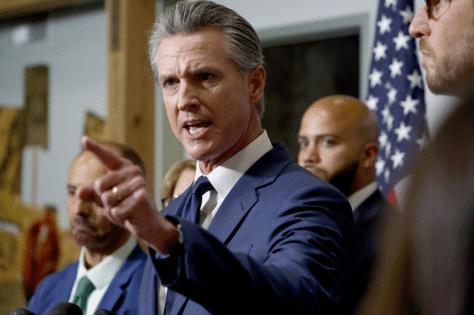Commentary: California can be a leader by taking menopause policy seriously
Published in Op Eds
Among the many audiences Gov. Gavin Newsom has provoked lately, one cohort is particularly fired up: menopausal women. I know I felt a rush of adrenaline (or perhaps it was a hot flash?) when I saw actor Halle Berry take to Instagram to demand the governor make menopause a public policy priority.
From Hollywood to Capitol Hill, menopause continues to be having a moment. But no entity has succeeded more than state lawmakers in transforming all the buzzy headlines into meaningful action.
Earlier this summer, CNN and NPR declared a “national movement” for menopause legislative activity, reporting a record 15 states introducing upward of two dozen bills as of July. So rapid and robust was this agenda, the digital news outlet Axios dubbed menopause policy “the new tampon tax” — another seemingly out-of-the-blue but wildly popular reform that swept through statehouses in recent years. (California is one of 22 states that has repealed sales tax on menstrual products over the last decade.)
The momentum was not so unexpected to me, though. I’ve written over many years on menstruation and menopause. I have engaged firsthand with lawmakers of all political stripes committed to these issues — for example, those who passed laws to ease the burden of the cost of period products. After the 2024 elections, I suspected there could be new political will to tackle menopause and embrace policies that could help ameliorate the challenges of finding adequate care and treatment for all its disruptive symptoms.
This conviction led me to team up with leading medical experts to publish a Citizen’s Guide to Menopause Advocacy back in January, with a foreword by the journalist and former California first lady Maria Shriver. We set forth many of the reforms that states are now embracing — things like better education for doctors and better information provided by public health departments, improved access to and insurance coverage of menopause treatments, and more robust workplace protections and accommodations.
Today, seven states have menopause laws on the books; California is one of them, having codified support for limited continuing medical education opportunities for providers. The tally will surely grow as several more states tee up new proposals for 2026 — like in Michigan, where a bipartisan pair of lawmakers recently filed several bills and Gov. Gretchen Whitmer kicked off a listening tour in communities around the state.
Here and now, all eyes should be on California’s latest legislative move. A 2025 bill championed by Assemblymember Rebecca Bauer-Kahan, AB 432, now poised for passage, addresses two key needs — affordability of care (requiring health insurance plans to cover menopause treatments) and quality of care (incentivizing clinicians to incorporate menopause-specific training as part of their professional licensing continuing education requirement).
AB 432 is a modified version of prior legislation that passed last year but was vetoed by Newsom, who argued at the time its provisions were “too far-reaching.” The current legislative language is responsive to his concerns, for example limiting coverage to FDA-approved menopause treatments. But there’s no guarantee of a gubernatorial green light, given statewide infighting over a broader array of health insurance practices and policies.
There is something much deeper than a single law at stake in California. The state is in a position to be a leader on menopause issues — not so much in the specific provisions, but in the culture.
California would not be the first state to pass the provisions that are in AB 432. As for insurance coverage, Louisiana holds that banner; its legislature became the first in the nation to require Medicaid and private health insurance plans to cover perimenopause and menopause treatments. Among other states at the fore, Illinois now has a dedicated Menopause Awareness Week, Maine passed funding for state health department educational resources, and Rhode Island is the first to establish workplace accommodation protections.
But Newsom’s own brand as a modern democracy avenger — California’s role in driving the national redistricting crisis response, the state’s self-proclaimed status as a safe haven for abortion rights — makes for a ripe opportunity to demonstrate and articulate that menopause belongs squarely in the pro-democracy discourse too.
Menopausal women are a contingent 75 million strong in the U.S. and entitled to accessible, competent healthcare and treatment. Our accumulated wisdom and experience contribute profoundly to the economy, to culture, to the body politic. We have every right to demand lawmakers and political leaders invest in our well-being, our dignity, our humanity. And we know that when we fight for ourselves, we also fight for our daughters — and for the future.
Halle Berry’s campaign is cleverly called “Turn Up the Heat.” Who better than an army of menopausal women to do so? Our democracy will be stronger for it.
____
Jennifer Weiss-Wolf is the executive director of the Birnbaum Women’s Leadership Center at New York University School of Law.
_____
©2025 Chicago Tribune. Visit at chicagotribune.com. Distributed by Tribune Content Agency, LLC.
























































Comments